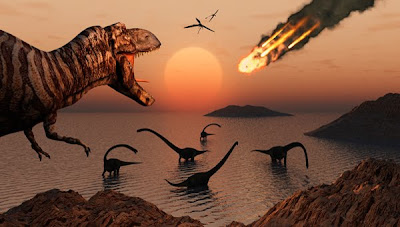Nature and Grace
From Andrew Sullivan's blog The Dish:
A reader writes:
A reader writes:
Thank you for continuing to engage Terrence Malicks's criminally under-attended The Tree of Life. Even as an atheist, I believe the film to be a masterpiece and an extraordinary source of beauty. I'd like to correct, however, Fr. Barron's otherwise lovely meditation on the film. He characterizes the encounter of the two dinosaurs as an example of "nature," and describes one dinosaur as "dominating" the other. In fact, the scene depicts both "nature" and "grace" - or, rather, the development of one following the other. The dominant dinosaur is shown pushing the injured dinosaur's face into the ground. This is "nature," as Fr. Barron describes. But the scene does not stop there. The dominant dinosaur then appears to effect something akin to mercy and backs away from the injured dinosaur, leaving him in peace. It would apear that Malick has shown us the birth of "grace."Another writes:
While I'm personally a Christian - and I was knocked out by Malick's film every bit as much as you were - I left the theater feeling it was a devastating, almost unanswerable challenge to the Christian message. If the film is asking whether the universe tilts toward nature or grace, I would say Malick puts his thumb on the scales every-so-slightly in favor of grace. But I had a powerful feeling in my gut that it's all just nature.I believe that is one core mystery that Christianity asserts: that despite all the power of nature, grace triumphs. It's as unlikely as a Resurrection. Another:
In one cut-away in the film, you see a wounded dinosaur approached by another hunter-dinosaur. When it looks like the hunter is about to finish off the wounded prey, it inexplicably walks away. Grace? Maybe. But I had the sinking feeling that the human experience of grace isn't any different in kind or meaning than a dinosaur deciding for some unknowable reason to walk away from its wounded prey.
Measured against the staggering scope of cosmic time, even the most meaningful personal events - or traumas - really are insignificant, even meaningless. That's the overall impression I carried from the film.
The two biblical stories Barron references have long bothered me. They both contain some thorny issues that most clergy, including Fr. Barron, sidestep. Why does God put the forbidden tree in the garden to begin with? The snake and the woman get the blame, but it seems like God is just taunting humans, daring them to break the rules. Before eating from this tree of knowledge, do Adam and Eve have no understanding of good and evil? Don't they actually gain from eating the fruit?
The Job story actually gives us an answer for God's perplexing actions, because we know more than Job does. He has gone through all of this crap because God and Satan have made a bet. How fair is that? When Job, justifiably, wants to know why such bad stuff has happened to such a good person, God just blows him off. "I'm God, and you're not. Mind your own business."
Both of these stories, it seems to me, tell us to remain ignorant. Don't ask questions, don't ponder too deeply. Life is hard, but even though God's reasons may be unjust, he's God, and you just have to suck it up.
I think Malick's film actually puts God in a much more favorable light than either of these Bible stories do. Jack accuses God just like Job: you let anything happen; you don't seem to care. But at least in Malick's version it's fair. Everybody suffers, everybody dies, and that's just the way of nature. That dinosaur gets a momentary reprieve, but the meteor is on its way. This is everyone's fate. At least there is a comfort in knowing that I have been a part of it, that all of life shares my personal grief, and that it's all so beautiful.
"Oh wow. Oh wow. Oh wow." I can't know what Jobs meant by that, but the ambiguity is fitting here.




Comments